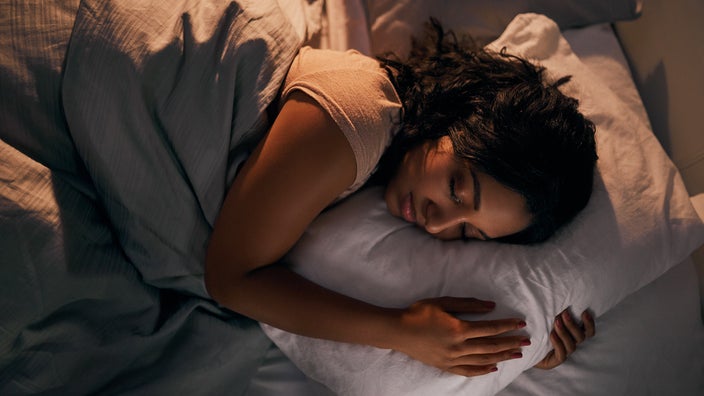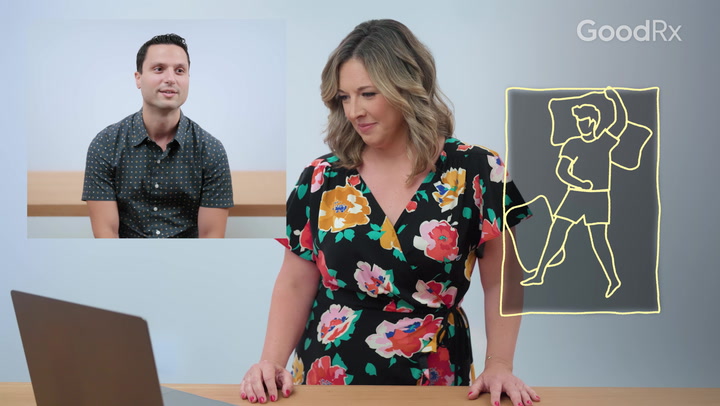
11 Ways to Practice Good Sleep Hygiene for a Restful Sleep
Key takeaways:
Sleep hygiene refers to habits that can help you get a better night’s sleep.
Maintaining a consistent bedtime, creating a routine, and limiting caffeine and alcohol intake are some ways to practice good sleep hygiene.
If you continue to experience sleeping problems despite practicing good sleep hygiene, speak with your healthcare provider or a sleep specialist.

According to experts, adults should get 7 to 9 hours of sleep per night. However, nearly one-third of adults in the U.S. report not getting the recommended amount of sleep. Not getting enough sleep or good quality sleep can affect your ability to focus, learn, and react. It can also result in anxiety, irritability, and stress.
What you do during the day and in the evening before bed can directly affect your ability to get a good night’s rest. Sleep hygiene refers to habits that support your ability to fall and stay asleep. And developing good sleep hygiene can help you get the recommended amount of sleep each night.
How can you improve your sleep hygiene?
If you think you’re not getting enough good quality sleep, you may benefit from adjusting some of your habits. Below, we discuss 11 ways to improve your sleep hygiene.
1. Create a comfortable sleeping environment
Your environment plays a large role in the quality of your sleep. The optimal environment for sleep is one that is cool, dark, and quiet. To create a comfortable sleeping environment:
Turn off all lights.
Use blackout curtains.
Turn off all devices that admit light.
Wear an eye mask.
Use a white noise machine or fan.
Wear ear plugs.
Keep the room temperature between 65 and 68 degrees Fahrenheit.
Wear comfortable clothing.
2. Establish a consistent bedtime
If you’re a parent, you know how important a consistent sleep schedule is for children. And the same is true for adults. To improve your sleep, stick to the same bedtime each night. Ideally, this should be at least 7 to 9 hours before you need to wake up in the morning.
It’s important to aim for a consistent bedtime even on your days off. Your body will start to associate a certain time of day with sleep. So not going to bed at that time, even on the weekends, can be disruptive.
3. Follow a relaxing bedtime routine
Having a routine is just as important as having a consistent bedtime. A bedtime routine signals to your body that it’s time to prepare for sleep. Your routine may include brushing your teeth along with doing a relaxing activity, like meditating, journaling, or reading a book. You will want to avoid anything strenuous or potentially stressful before going to sleep, like exercising or using electronics.
4. Try deep breathing exercises
Taking a few minutes to practice deep breathing before bed can help support relaxation, reduce stress, and improve sleep.
To practice deep breathing, follow these steps:
Lie down comfortably on your back.
Put one hand on your chest and the other hand on your stomach.
Inhale through your nose while you count to four, feeling your stomach rise.
Exhale through your mouth while you count to six, noticing your stomach contract.
Repeat this for several rounds of breath.
5. Limit your exposure to bright light before bed
Light has an effect on your circadian rhythm, your internal clock that signals when it’s time to go to sleep and wake up. Being exposed to too much bright light at certain times of day can interfere with your ability to fall asleep.
To support good quality sleep, avoid bright lights 2 hours before bedtime. This includes light that comes from the television and other electronic devices. While it may be ideal to avoid electronic devices before bed entirely, you can minimize the effects on your sleep by dimming their lights 2 hours before bedtime.
6. Avoid alcohol and caffeine before bed
Caffeine and alcohol are both disruptive to sleep and should be avoided before bedtime.
Search and compare options
Caffeine is a stimulant that increases energy and alertness, effects that can make it difficult to fall asleep. It’s recommended that you stop consuming caffeine at least 6 hours before bed. This includes caffeine from:
Coffee
Caffeinated teas
Energy drinks
Certain sodas
Chocolate
Alcohol, on the other hand, is a depressant that can cause temporary drowsiness. Despite this effect, it’s a myth that drinking alcohol supports sleep. In fact, drinking alcohol is associated with more nighttime awakenings and disrupted sleep. It’s also been linked to sleep disorders like sleep apnea. For optimal sleep, avoid drinking alcohol entirely, or at least before bedtime.
7. Stop drinking all liquids a few hours before bed
Drinking liquids too close to bedtime may cause you to have to go to the bathroom several times during the night, which can be disruptive to your sleep. Stop drinking liquids at least 2 hours before bed, so your body has time to eliminate them before it’s time to go to sleep.
If you find yourself thirsty at night, try to drink more water during the day and take small sips of water at night.
8. Eat lightly in the evening
Eating heavy meals or snacking before bed can also disrupt your sleep. To optimize your sleep, try to eat dinner at least a few hours before bed and keep nighttime snacking to a minimum. If you find yourself hungry at night, stick to light foods that don’t have too much sugar.
Read more like this
Explore these related articles, suggested for readers like you.
Some foods have even been found to contain melatonin, a hormone that helps regulate sleep. Eating melatonin-rich foods a few hours before bedtime may help support better sleep. These include:
Eggs
Salmon and other fish
Tart cherries
Mushrooms
Nuts, like pistachios and almonds
Milk
9. Exercise in the morning or afternoon
Exercising regularly, even just 10 minutes a day, is associated with better sleep. People who do vigorous exercises, such as running or weight training, tend to sleep the best. But any form of exercise can provide sleep benefits.
Because exercise can be stimulating, you may want to get your workouts in during morning or afternoon hours and leave your evenings for more relaxing activities.
10. Only use your bed for sleep and sex
Sleep experts recommend limiting your time in bed to sleep and sex. Don’t use your bed for other activities, like working, watching television, or scrolling through your phone. You want to associate your time in bed with rest, so that your body will be prepared to sleep when you lie down.
11. Don’t watch the clock
When you have trouble falling asleep, you might find yourself watching the clock and counting the hours until you have to wake up. This tends to increase your anxiety, which makes it harder to fall asleep.
If possible, keep all clocks out of sight when you’re trying to go to sleep. If you can’t fall asleep after 20 to 30 minutes, you may want to get up and do a non-stimulating activity, like reading a book or meditating. Then, go back to bed and try again. You can also try repeating a statement to yourself, like “Sleep will come.”
What if you still can’t fall or stay asleep?
If you’re still struggling to fall or stay asleep after taking steps to improve your sleep hygiene, you may be experiencing insomnia, a common sleep disorder. People with insomnia have difficulty falling or staying asleep at least three nights a week. If this goes on for at least 3 months, it is known as chronic or long-term insomnia.
Insomnia can be caused by stress or changes in a person’s sleep schedule. But, in some cases, there is no known cause.
Talk to your healthcare provider or a sleep specialist if you think you might have insomnia. They will be able to review your sleeping patterns and determine if you are, in fact, dealing with insomnia. For help locating a sleep specialist, you can search the American Academy of Sleep Medicine’s directory of local healthcare centers.
Why is sleep hygiene important?
Sleep hygiene is important because your physical and mental health are directly related to your sleep quality.
Sleep deprivation or deficiency can negatively affect your health and well-being in several ways. It can result in:
Chronic health problems: Sleep deficiency may contribute to health issues like diabetes, heart disease, high blood pressure, and kidney disease.
Accidents and injuries: Not getting enough sleep can affect your reaction time and judgment. This may increase the risk of motor vehicle and other accidents, falls, and broken bones.
Emotional and behavioral issues in children: Poor sleep in children is linked to higher rates of stress, anxiety, depression, impulsivity, and cognitive difficulties.
Mental health issues: Not getting enough sleep increases the risk of mental health symptoms like anxiety, depression, and suicidal ideation. People who do not get good sleep have more difficulty coping with their emotions and may be more emotionally reactive.
The bottom line
Your habits around bedtime — also referred to as sleep hygiene — play a significant role in the quality of your sleep. If you’re having trouble falling or staying asleep, making changes to improve your sleep hygiene is the first step.
Having good sleep hygiene includes creating consistency around bedtime, making sure your environment supports sleep, and eliminating alcohol and caffeine before bedtime. If you have good sleep hygiene habits and continue to experience issues falling or staying asleep, speak with your healthcare provider or a sleep specialist.
Why trust our experts?



References
American Academy of Sleep Medicine. (n.d.). Find a healthcare center.
American Academy of Sleep Medicine. (2020). Healthy sleep habits.
Centers for Disease Control and Prevention. (2016). 1 in 3 adults don’t get enough sleep.
Columbia University Department of Psychiatry. (2022). How sleep deprivation impacts mental health.
Drake, C., et al. (2013). Caffeine effects on sleep taken 0, 3, or 6 hours before going to bed. Journal of Clinical Sleep Medicine.
Jareth, R., et al. (2018). Self-regulation of breathing as an adjunctive treatment of insomnia. Frontiers in Psychiatry.
National Center for Complementary and Integrative Health. (2022). Melatonin: What you need to know.
National Heart, Lung, and Blood Institute. (2022). Insomnia - Diagnosis.
National heart, Lung, and Blood Institute. (2022). What are sleep deprivation and deficiency?
National Heart, Lung, and Blood Institute. (2022). What is insomnia?
National Institute for Occupational Safety and Health (NIOSH). (2020). Creating a good sleep environment.
National Institute for Occupational Safety and Health (NIOSH). (2020). NIOSH training for nurses on shift work and long work hours.
National Institute for Occupational Safety and Health. (2023). Effects of light on circadian rhythms.
National Institutes of Health. (2022). Children’s sleep linked to brain development.
Oelke, M., et al. (2017). A practical approach to the management of nocturia. The International Journal of Clinical Practice.
Park, S., et al (2015). The effects of alcohol on quality sleep. Korean Journal of Family Medicine.




























